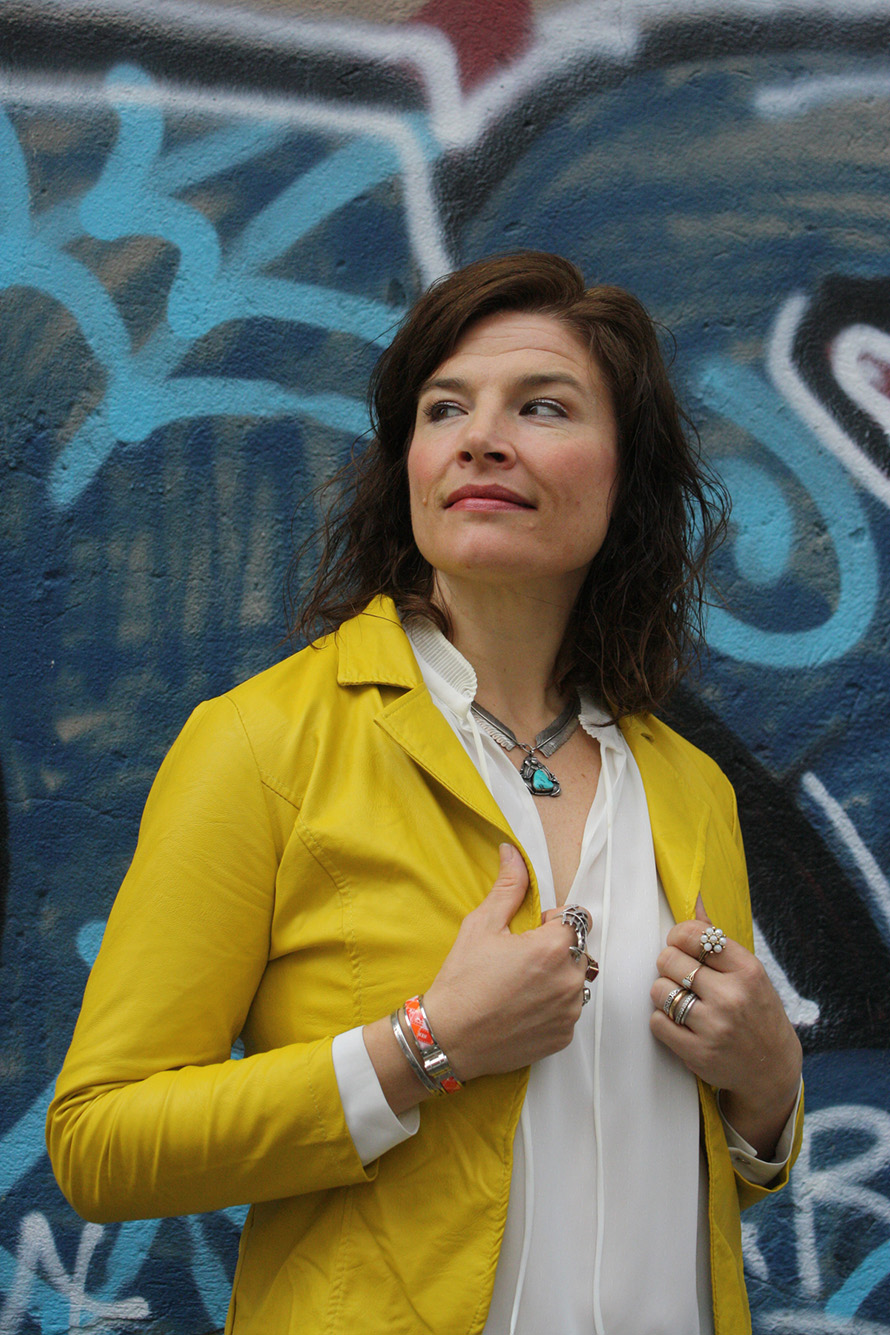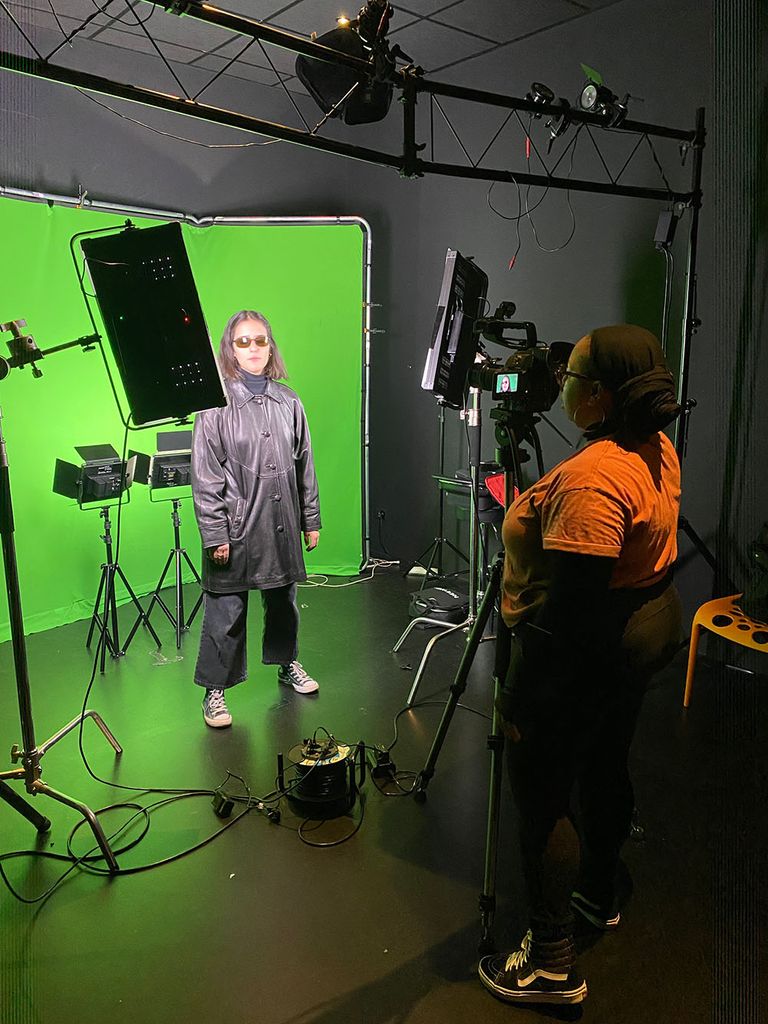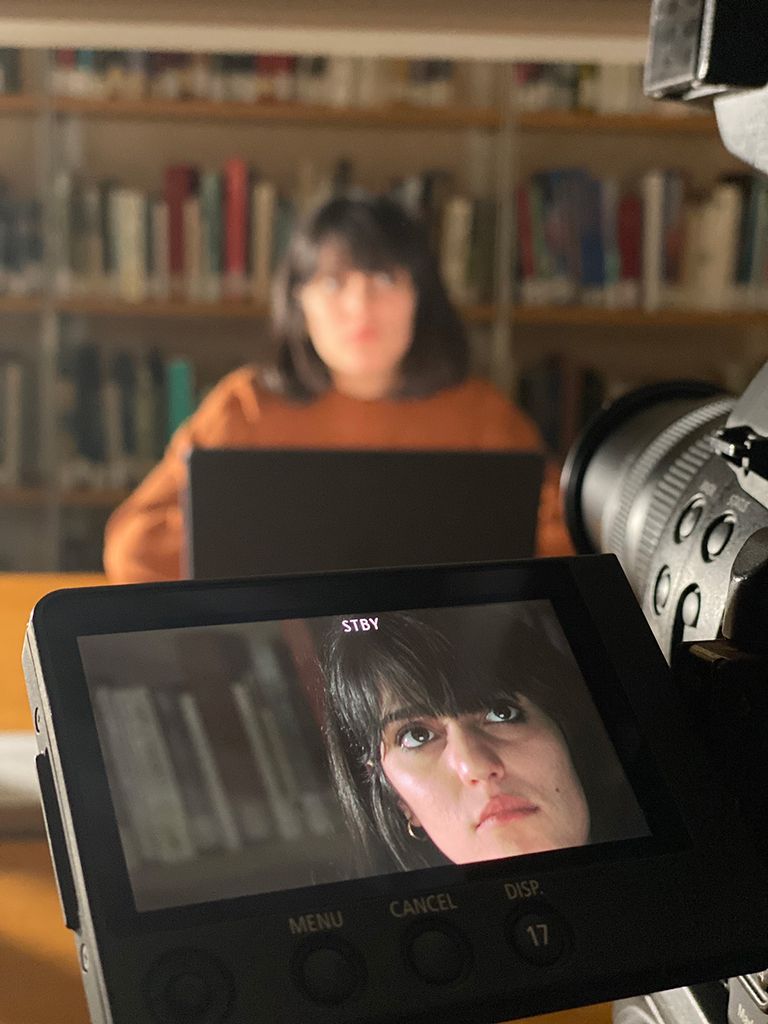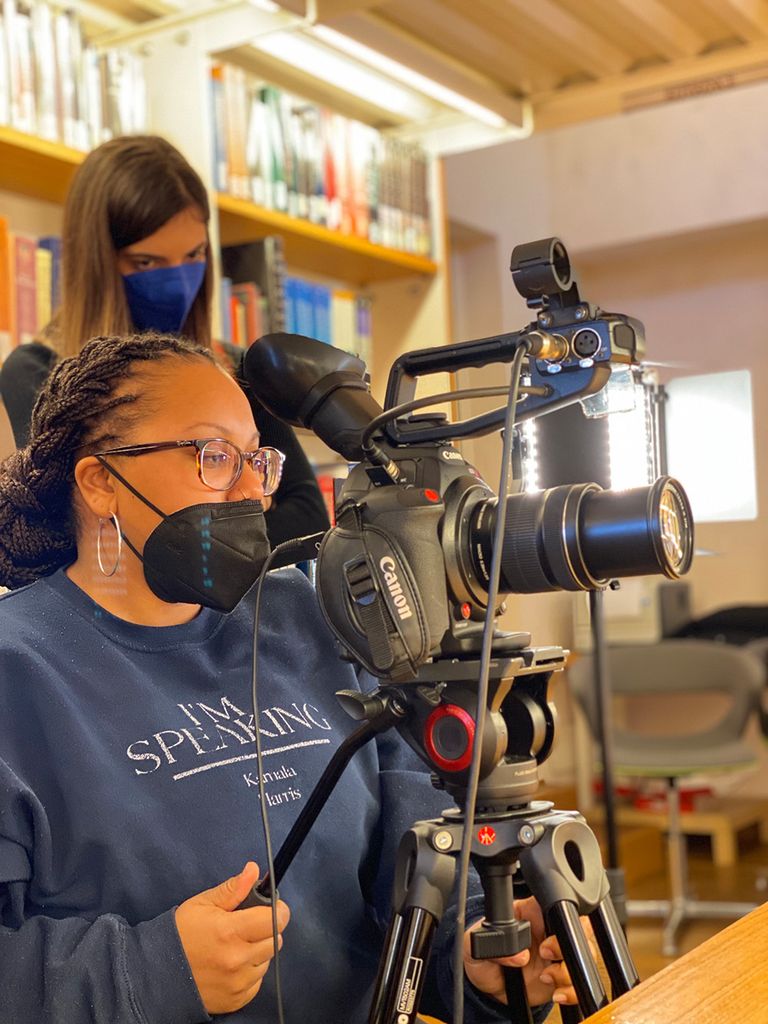Opening Doors: Jenn Lindsay (GRS’18), Founder of So Fare Films
“We're diverse people telling diverse stories about diversity,” the Rome-based filmmaker says about her production company

Jenn Lindsay (GRS’18),
Founder of So Fare Films
They are determined to use their experience, influence, and positions to help make their business, organization, and world more inclusive. They are breaking barriers—and then reaching back to help those behind them overcome the same hurdles. They are BU alumni, faculty, and staff—of every race, ethnicity, age, and gender—and they are “Opening Doors” for the next generation.
Jenn Lindsay’s film career has taken her all over the world. Boston, Rwanda, Indonesia, Rome—the last where she settled six years ago and established So Fare Films, a soup-to-nuts production company and training program for young filmmakers.
Helmed by Lindsay (GRS’18), who earned a doctorate in philosophy in the social science of religion at Boston University, So Fare’s (so fare, pronounced so far-ay, means “I know how to make” in Italian) media revolves around inclusivity. The company primarily produces documentaries and docuseries about social and religious diversity—such as the COVID-era film Quarantined Faith—educational diversity, equity, and inclusion (DEI) videos for organizations, and “how-to” videos on both filmmaking and DEI topics.
So Fare’s Emerging Creators internship program also trains young filmmakers from populations historically excluded from the industry, among them women, LGBTQ+ individuals, and people of color. Many of the interns are Lindsay’s students at Rome’s John Cabot University, where she teaches sociology and communications. The new Women in Progress docuseries, which follows female entrepreneurs in different industries in Rome, is completely produced, shot, and edited by the Emerging Creators interns.
When she first entered the industry, Lindsay never could have imagined leading a production company of 40-plus. A solo shoot for a project in Rwanda ultimately set her on a path that would lead to So Fare: “I was talking to somebody, and he told me this proverb that gave me a total paradigm shift: ‘If you want to go fast, go alone. But if you want to go far, go with others.’ I was like, oh…filmmaking is a team sport.”
Years later, that’s the ethos she and So Fare carry into all of their projects, Lindsay says. From highlighting untold stories to teaching the next generation how to write press releases, apply for grants, and operate an editing bay, So Fare is working to make filmmaking an industry for all.
“We’re on a journey together, both in the inner sanctum of the company and collectively as people trying to live more productive, meaningfully connected lives,” she says. “And we think that leveraging the power of the media to make that a better experience is worth our time.”
Bostonia spoke with Lindsay about her work with So Fare and why media representation is crucial for audiences and subjects.
Q&A
with Jenn Lindsay
Bostonia: Can you talk about your experience as a “woman in film” and as someone creating opportunities for other women in the industry?
Lindsay: It’s funny, with So Fare and also with my own trajectory, we never set out to be a “women’s revolution.” We weren’t reacting to anything other than a lack of opportunity [in the industry]. In my experience within the incredibly competitive studio and broadcast context, I always noticed that there were all these guys with really nice equipment: amazing editing bays, super-fly 4K cameras and stuff. So they had amazing reels. And they all knew each other. I just did not know how to break into that network, and I also didn’t have the money for it. I think because I was so mystified by my agency and access challenges that instead of going to film school at that point, like some people would have, I was like, “I just gotta do it myself.”
Fast forward a decade and a half, when I put together the first few semesters of postproduction staff for So Fare [from my students at John Cabot]. The school, and especially the communications department, has a heavier female population, so it was natural that young women would gravitate to me as a mentor. At some point, we looked around and were like, “Oh, this is a sisterhood.” We didn’t mean to do that, but here we are.
We do represent a response to these overwhelming industry trends. We talk a lot about whether or not to market ourselves as a women’s production company, because we don’t want to seem like a “Bic pen for her!”—as if we weren’t real filmmakers. Like, yeah, we’re women filmmakers, but we’re filmmakers, goddammit! And it’s kind of crazy because we want to say that female filmmakers are just as good as male filmmakers, but we just don’t know that because historically, female filmmakers have not had agency and access. If a female director is building her reel to audition for a gig, chances are she doesn’t have a ton of friends with cranes and dollies and set keys, like the way that men statistically have had in the industry. So, we think we’re just as good—if not better—but we also have to build the infrastructure for ourselves. And so that means our careers are slower, and it’s harder to get funding and all that stuff.
Bostonia: Absolutely. So, what does creating those paths of access in filmmaking do for the industry—and viewers—as a whole?
Lindsay: I can answer that in two ways: as a social scientist, and also as the owner of a production company. As a social scientist, I can say that media representation usually affects two primary populations: the people being represented—or misrepresented or underrepresented—or stereotyped or tokenized. Younger people, especially, often internalize defamatory images of their communities. And it can be a self-fulfilling prophecy: there’s a lot of interesting research in sociology about the power of the media of representation of oneself, and how that can become a script that people internalize and then start to execute. Especially, for some reason, if it’s an unflattering portrait, because it has more emotional force. The other demographic who’s hurt by poor media representation is audiences, because we often develop schematic imaginations based on our media exposure. If you don’t have any contact with members of a particular community in order to disrupt stereotypes, our schematic imaginations become very emotionally charged and difficult to change. Example: if you’re a little kid milkfed on Aladdin, where the good guys have American accents and the bad guys have Arabic accents, there’s something very subtle being encoded in your long-term memory.
As the business owner of a production company, I want to talk about the three populations that we bring value to. One is our inner team, the young people working in filmmaking. They’re having their first professional experiences in grant writing, film producing and budgeting, screenwriting, and all that. Just feeling empowered as they learn by doing is big. I see these young people discovering things about themselves that they didn’t know, because they hadn’t been able to put the pedal to the metal before. The second population that we feel that we serve is the people whose stories we tell. This is part of our mission to bring positive media representation of communities that suffer from poor representation. Here in Europe, that largely means members of the Romani or Muslim communities. They experience the same sort of “savage” misrepresentation you see in the United States. Third, we hope that we’re providing value to our audience members. With our edutainment content, the hope is that it’s awesome and illuminating and enjoyable, and also pushes the boundaries of a new perspective. Documentary storytelling is a cost-effective way of traveling and making contact with a new community.
At So Fare, we like to say that we’re diverse people telling diverse stories about diversity. With that, I feel like if you’re not connected to the group that you’re trying to tell a story about, there might be a temptation to be self-celebratory. Like, “Here’s a Black gay man—we’re so woke!” If you look at shows like Netflix’s Never Have I Ever and Sex Education, they’re so good about subtle diversity, where it’s just like this person living a life. You don’t call attention to their Blackness every single time they talk. Unfortunately, minorities sometimes have to hold the mantle for their entire ethnic group. And so [while we make diverse content], we are very aware of calling too much attention to diversity, and we try to walk that edge.




Behind-the-scenes shots from So Fare projects.
Bostonia: To that end, do you think the industry is getting better since you started out?
I think that we are actually in a really beautiful zeitgeist right now with media representation. We’re starting to really understand bias in the news and the destructive impact of poor representation for multiple parties. I see these new shows emerging that are really promising. And it’s great, because we at So Fare are not revolutionaries—we embody a response to a broken industry in terms of content and employment, but we’re not breaking ground. That is great, because you have to have critical mass [to create real change].
Everyone in the documentary world says that we’re also in a golden age of documentary, really due to better accessibility of equipment. We’re all carrying incredible cameras around in our pockets at all times, right? With just a little bit of education about frame composition and the rule of thirds, and how to capture good audio, and even downloading fabulous free professional editing programs like DaVinci Resolve 16, you can bring a really good film to a film festival for almost no bucks. It’s incredible where we’re at, which is really exciting.
And it also makes it possible for us to start a company like this. It used to be that starting a production company, you’d have to get [a lot] of equipment, and there would be so many access issues that would make it really hard to get off the ground. I’ve always been working with, like, Scotch tape and chewing gum, and now it’s just writ large, and a lot of us are doing it together. You don’t have to pay 100 bucks a month for an Adobe Creative Cloud account, you can get a $100-a-year Canva Pro license and your graphic design can look just as good. It makes the market a little bit more competitive—and a little more full of crappy work—because everyone can access the market. But there is so much more opportunity for voices to break through, and we’re really benefiting off of that excess shift.
Bostonia: We’ve talked a bit about the “dark side” of inclusivity, which can include things like tokenism and stereotyping. Why is it important for companies to keep up, even increase their inclusivity efforts, through missteps or mistakes?
There are a lot of layers to that. One is that we’re in a zeitgeist of DEI initiatives since the [2020] murder of George Floyd. Hundreds and thousands of companies, whether for PR reasons or genuinely believing in the importance of this effort, have invested in these measures. And because so many people are involved now, it’s worth thinking really hard about devising methodologies for effective DEI so that we’re not all wasting our time. There’s a lot of research that says that it doesn’t work when it’s mandated, when organizations impose sanctions, or when privileged demographics feel alienated and defensive.
Also, the numbers are pretty clear that diversity is not going anywhere. Within the next 20 years, the white, non-Hispanic majority of the United States will be the minority. There’s one study from Boston Consulting Group showing that more inclusive management teams enjoy something like 19 percent more revenue due to inclusivity. So there’s a real clear bottom-line argument there. And, it’s just the right thing to do… We know that working together across social divides can lead to a cross-fertilization of ideas and creativity, innovation, and leveraging of the creativity at the heart of pluralism. We should want to see what that leads to.
This Series
Also in
Opening Doors
-
August 5, 2024
Opening Doors: Ellice Patterson (Questrom’17)
-
May 29, 2024
Opening Doors: Michele Courton Brown (CAS’83)
-
March 28, 2024
Opening Doors: Rhonda Harrison (ENG’98,’04, GRS’04)


Comments & Discussion
Boston University moderates comments to facilitate an informed, substantive, civil conversation. Abusive, profane, self-promotional, misleading, incoherent or off-topic comments will be rejected. Moderators are staffed during regular business hours (EST) and can only accept comments written in English. Statistics or facts must include a citation or a link to the citation.